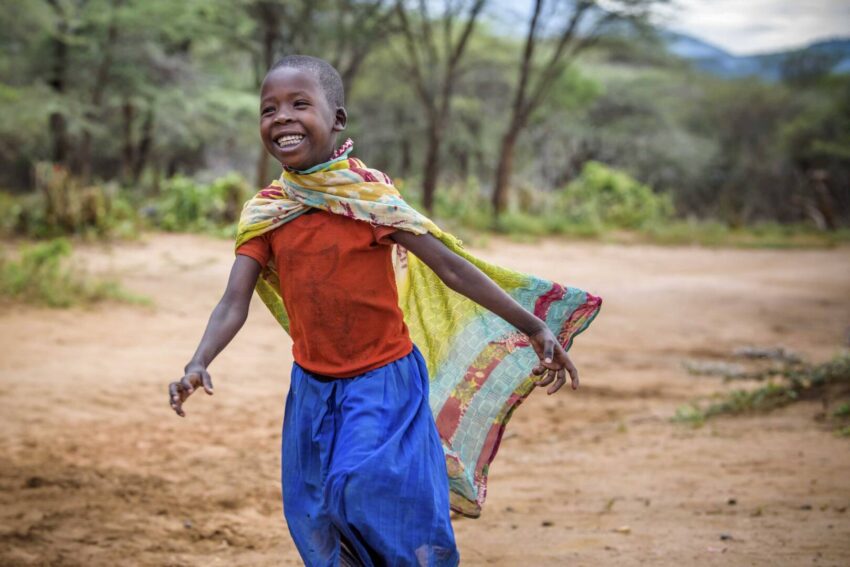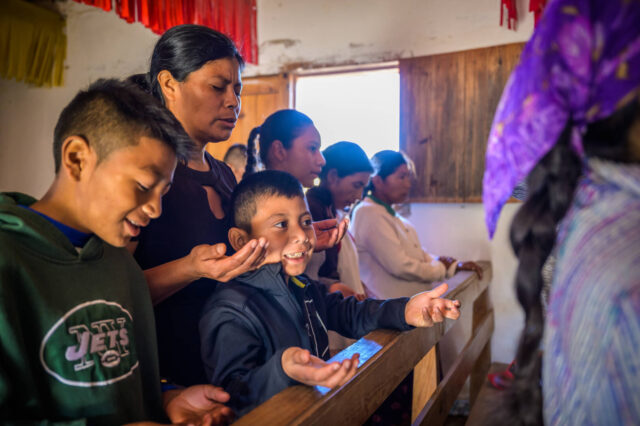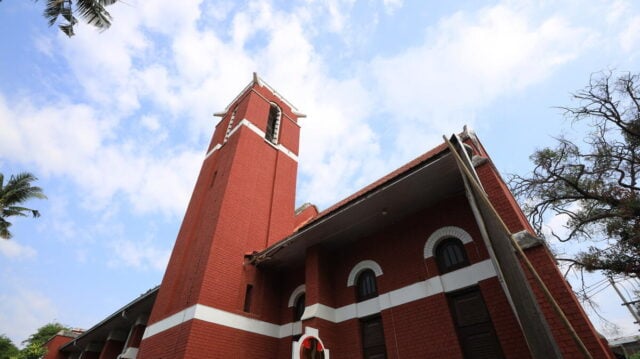Try these 10 fun and easy games and activities your family can do at home during the Christmas season (and beyond!). Each one teaches valuable lessons about gratitude, generosity, and giving back.
Family-fun activities
-
- DIY toy build » See how kids without toys make their own and how you can too.
- Food find » Learn about the causes of hunger and solutions to food shortages.
- Quick escape » Role-play tough choices refugees have to make.
- Soup share » In this fun twist on a storybook classic, see how if we share and work together, there can be enough for everyone.
- Birthday survival » Find out about the special health challenges of very young kids who live in poverty.
- Gift-giving » Discover how unique gifts make a difference for the giver and receiver.
- Christmas ornament » Create a star and reflect on our true Source of hope — Jesus!
- Three gifts of the magi » Be inspired to give the gift of prayer and service to people in need this year.
- Wear it again » Step into someone else’s “shoes” by rewearing the same clothes from yesterday and considering how to cut back on excess.
- Hard times, stolen dreams » Consider the realities of child labor and pray for children around the world to be protected.
Did your family benefit? Share with a friend!
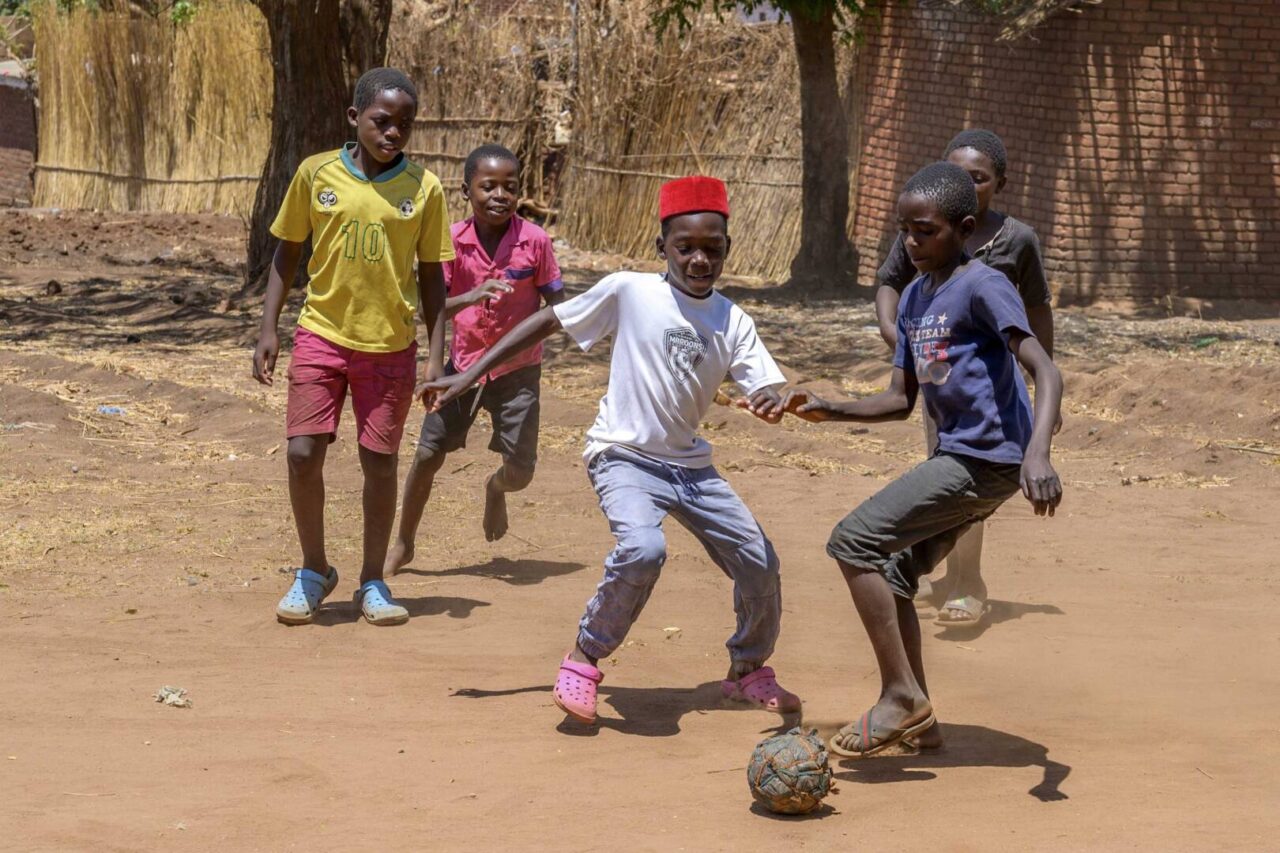
1. Family activity: DIY toy build
Most kids living in poverty don’t have many toys, but that doesn’t stop them from playing. They make toys out of what they find. The goal of this family activity is to be grateful for what you have — especially before Christmas Day arrives.
What you’ll need:
- 10 simple items (not toys) picked by your kids from around your house or outside
- Tape
- Scissors
- Markers
Do the activity with your family
Gather 10 items you can recycle from around your house or outside that aren’t toys (e.g., plastic bags, empty paper towel rolls, empty milk cartons, cardboard boxes).
Once you’ve gathered your supplies, ask your kids: How many toys do you have? Do you think you have enough toys? How many toys did you ask for last Christmas or on your birthday?
Then brainstorm together: How many toys can you make out of these items? What kinds of new games can you make with them?
Need inspiration? See what other kids around the world do for toys or try this tutorial for making a soccer ball.
Play it forward: What did you learn?
Creating your own toys means you activated your creativity. Building them took cooperation. What special talents do you see in your family? Take turns telling everyone in your family what talents you appreciate about them.
Pay it forward by helping your kids clean out their toys and donate the ones they don’t use anymore to a thrift store or a family who may not see toys under the Christmas tree. You can also choose to give fewer gifts to each other this Christmas and more gifts to a local family using your church’s giving tree (tip: email your pastor if you are worshiping from home). Another option: Give soccer balls and new toys to kids who don’t have them.
Rejoice always, pray continually, give thanks in all circumstances; for this is God’s will for you in Christ Jesus.—1 Thessalonians 5:16–18 (NIV)
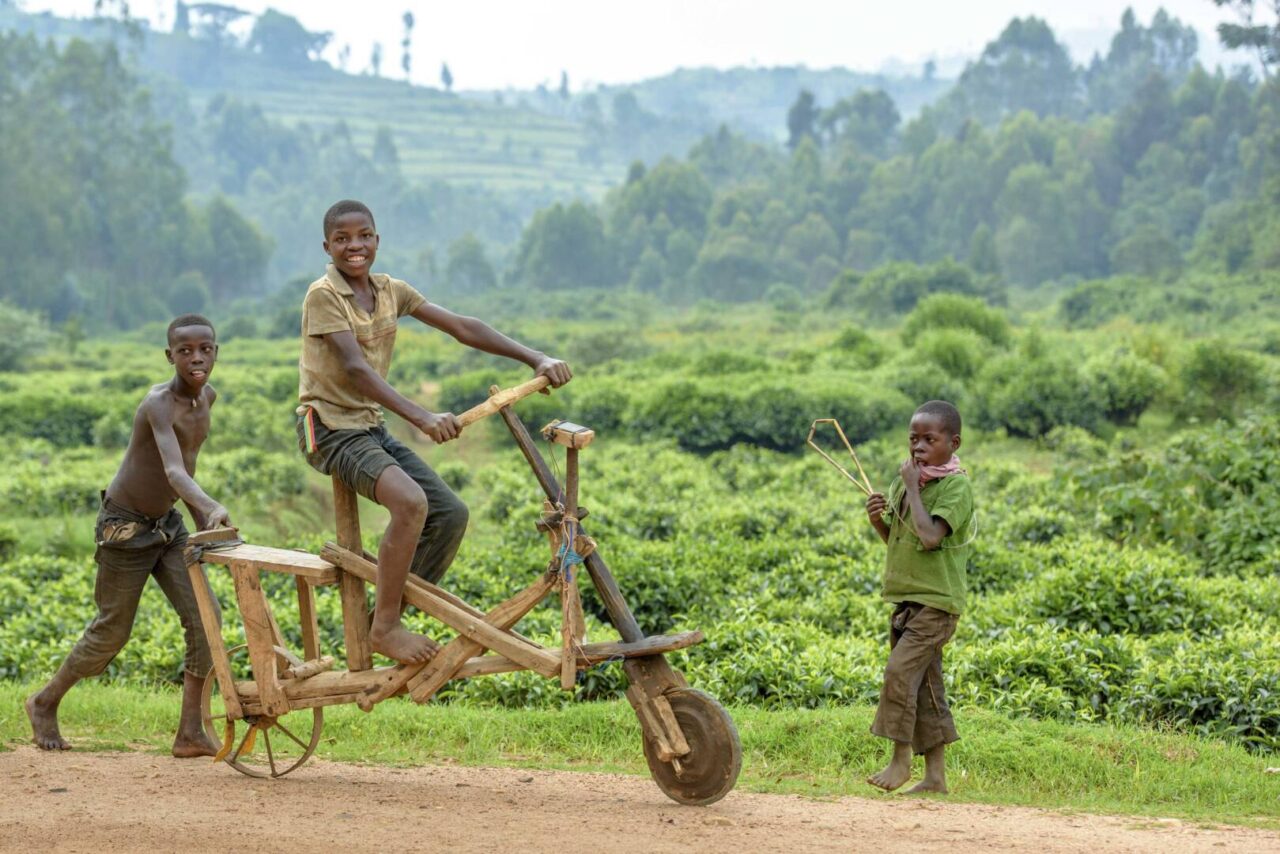
2. Family activity: Food find
Chances are you’ve already dropped off extra food this holiday season at a local shelter or food bank. But hunger is an issue for many people year-round. In fact, nearly one in every 11 people on the planet doesn’t have enough to eat, even though enough food is produced worldwide to feed everyone. Why is that?
Many poor farmers around the world are unable to grow enough food to feed their own families. Sometimes it’s because they don’t have the money to buy good seeds. Sometimes it’s the weather — too much rain, or not enough, can ruin crops they’ve planted. Sometimes it’s because disease harms the plants. Sometimes it’s because they grow enough food for part of the year, but lack proper storage to save food for the cold or dry seasons.
People who don’t grow their own food often go hungry because they lack the money to buy it. And nutritious food is more expensive than less healthy, processed food.
This game will get your kids thinking about how hard it is for some children to find enough food to eat. You’ll need three to five food items for each child playing (e.g., banana, apple, orange, ear of corn, carrot, bag of rice, bread in a sandwich bag).
Play the game with your family
Hide all the food items before you start the activity. Tell your kids the number of items you’ve hidden, and if you’re at home, let them know that you didn’t hide them in the kitchen or anywhere else you typically have food. Then give them an appropriate time limit to find them. After they’ve gotten them all, come back together.
Play it forward: What did you learn?
Sit down for a discussion with your kids: How did you feel when you found the hidden food? Were the items easy or hard to find? Think about the last time you were hungry. What happens to you when you’re hungry? Do you ever get “hangry”?
Then, learn more about how World Vision is fighting hunger around the world, and consider donating to help end hunger.
You can also help local organizations feed people in your community who are hungry. Find out what your local food bank needs, not just for the Christmas season, but all year long. Be sure to add those items to your grocery list this weekend. Or, feed a family in the U.S. with a Family Food Kit.
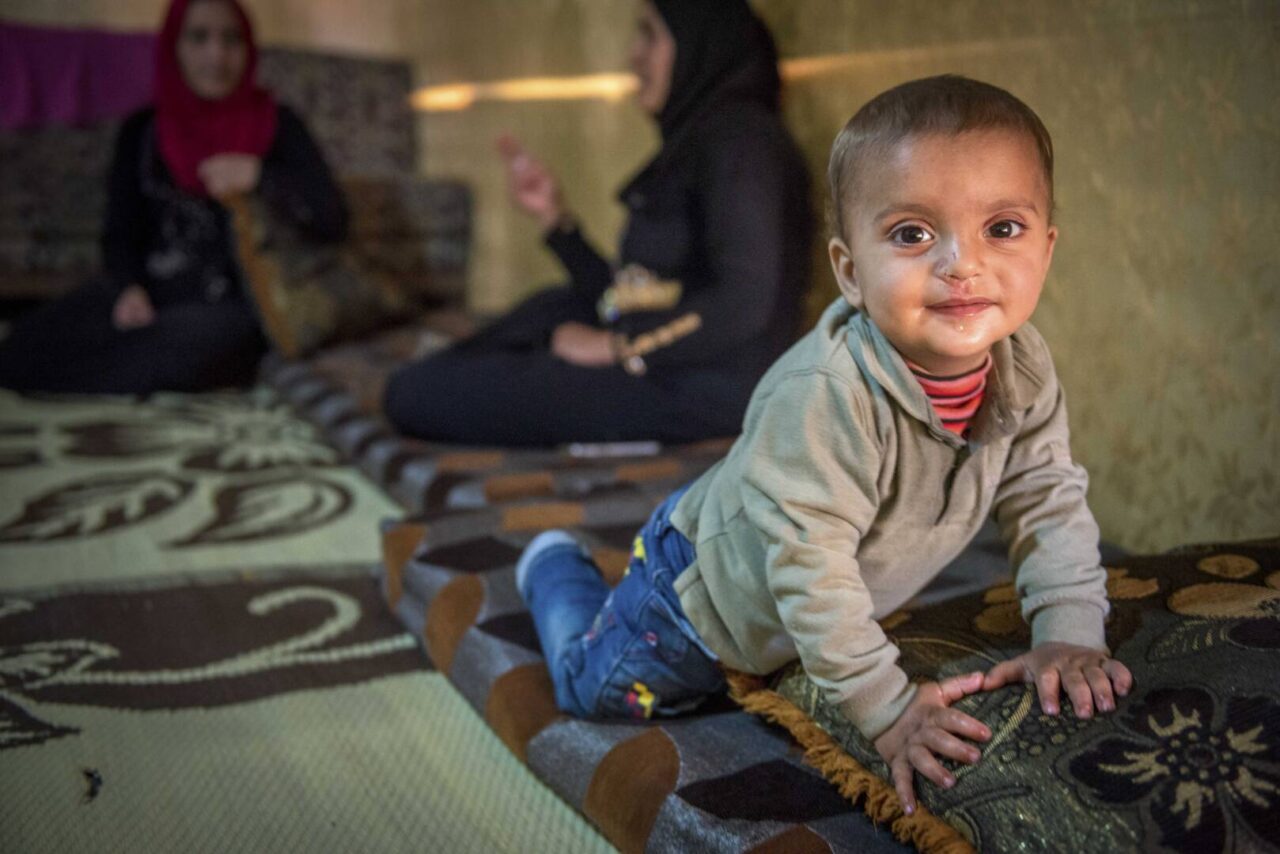
3. Family activity: Quick escape
The goal of this game is to differentiate between wants and needs (something good for kids to think about at Christmas!), and to imagine the choices refugees make.
What you’ll need:
- A representative object for each item on the packing list: Food, candy, water, personal ID, other important documents, books, sports equipment, money, clothing, sentimental toy, bed, medicine, family, computer, phone
- Backpacks or a bag big enough for all items on the packing list
Play the game with your family
A new planet has been discovered, and our family gets to go! Close your eyes for a minute and imagine: How will we get there, what will it look like, and who will we meet? Okay, open your eyes. What’s similar and what’s different about what each of us imagined? Now let’s pack our 15 items to bring:
Wait! Mission Control has just limited our cargo space to 10 items, so we need to take out five items. What do we want to take, and what do we need to take?
Uh-oh. An emergency announcement just came through that there is even less space available. We can only take seven items. Take out three more items.
Alert! Alert! Dangerous weather conditions have caused us to unexpectedly lose two items (have a participating member choose those items while you aren’t watching).
We should now have only the items that are essential for survival, and perhaps have lost one or two sentimental items, torn away by the elements. What do you think? What was easy about choosing what to leave behind? What was harder? How do you feel?
Play it forward: What did you learn?
Discuss the difference between want and need. What does a person truly need to survive? What would you take if you had to leave your home because war broke out and it was too dangerous to stay? Millions of families have had to make that choice. They are called refugees. What is a refugee? It’s a person who has been forced to flee their home country because of war, persecution, or violence.
What do you know about refugees? Learn more about the Syrian refugee crisis and watch about a family making decisions about what they would take with them.
Now that you know more about the difficulties faced by refugee families, consider adding them to your prayers. Here are some prayer ideas:
- Heavenly Father, help refugee families get the food, water, and medicine they need. Protect them and bring them to a place of safety.
- Prince of Peace, take care of refugee children. Help them find safe homes and access to school. Help their parents find jobs to take care of them. Heal them of scary memories.
Your kids might be creating Christmas wish lists right now. Consider visiting the World Vision Gift Catalog together and giving a family gift to help bring hope and joy to children who have so little.
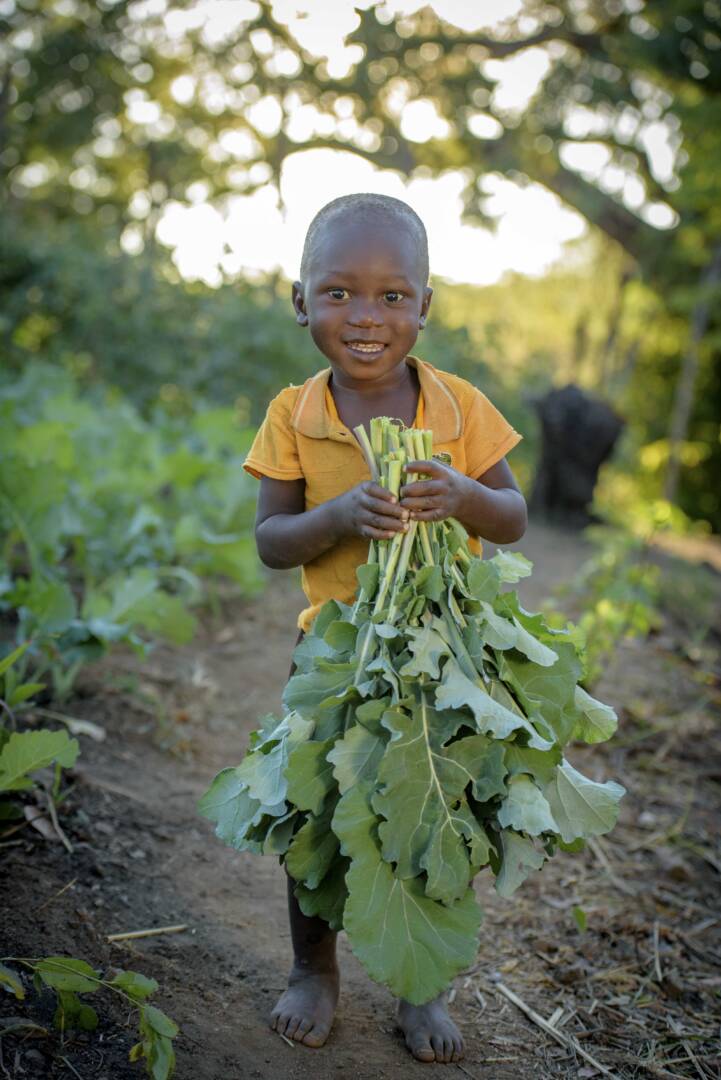
4. Family activity: Soup share
Sometimes all of us, especially children, feel unable to make a difference with the little we have. But together, even the smallest contributions multiply — so everyone gets back more than they gave. Learn about the importance of sharing through this story about stone soup — and learn how to make it!
What you’ll need to make stone soup (feeds 6 to 8)
- Large pot
- 3 medium-sized stones, washed clean
- 1 tablespoon oil
- 1 onion, diced
- 4 cups vegetable stock
- 1/2 cup peanut butter
- 2 cups fresh or canned tomatoes with juices, diced
- 1/4 teaspoon crushed red pepper flakes
- 1 cup cabbage, finely chopped
- 1 cup sweet potatoes, peeled and chopped
- 1 cup carrots, peeled and chopped
- 1 cup turnips, peeled and chopped
- 1 cup okra, chopped
- 1 to 2 cups cooked chicken, chopped
- Salt and pepper to taste
In Zambia and other places where World Vision works, health staff teach mothers to combine three kinds of foods (the approach is called Go, Grow, Glow) to ensure their children receive the nutrition they need. “Go” is energy food: grains, roots, and tubers. “Grow” foods — proteins like milk, eggs, legumes, fish, and chicken — build the body. “Glow” foods, fruits and green leafy vegetables, help protect the body from disease.
Do the activity with your family
Read the following story about stone soup:
Three travelers walked slowly down a road in a strange country. They were tired and hungry. They had eaten nothing for two days.
“I would like a good dinner tonight,” said the first. “And a bed to sleep in,” added the second. “But that is impossible,” said the third.
Soon they saw a village. “Maybe we’ll find a bite to eat and a bed to sleep in,” they thought.
When the villagers heard that three strangers were coming, they were worried. “Here come three strangers,” they said. “Strangers are always hungry. But we have so little for ourselves.” So, they hid all their food.
The travelers stopped at a house. “Good evening,” one said. “Could you spare a bit of food?” one asked.
“And do you have a corner where we could sleep for the night?”
“Oh, no,” the man lied. “We have nothing to share.” Then the woman lied, “And our beds are full.” At each house, the response was the same.
The travelers talked together. The first one called out, “Good people! We are three hungry visitors in a strange land. We have asked you for food, and you have no food. Well, we will have to make stone soup.” The villagers stared.
The travelers asked for a big iron pot, water to fill it, a fire to heat it, and three stones. They dropped the stones into the pot.
[Take out the pot and drop in the stones.]
“Any soup needs salt and pepper,” the first one said, so some children ran to get salt and pepper. “Stones make good soup, but carrots would make it so much better,” the second traveler added. A woman replied, “Why, I think I have a carrot or two!” She ran to get the carrots. “A good stone soup should have some potatoes,” said the third traveler. Another woman said, “I think I can find some potatoes.” And off she went. The travelers said, “If only we had a bit of barley, this soup would be fit for a king!” And so another villager found some barley.
“The soup is ready,” said the travelers. Tables were set up in the square, and all sat down to eat.
Never had there been such a feast. Never had anyone tasted such delicious soup made from stones! The mayor offered beds at his home for the travelers. In the morning, the villagers gathered to say goodbye.
“Many thanks to you,” the people said, “for we shall never go hungry now that you have taught us how to make soup from stones!”
Now let’s finish making our stone soup! (Feel free to remove the stones first.)
Make stone soup
Directions:
- Heat oil in a large pot over medium heat.
- Sautee onions about 5 minutes or until translucent.
- Whisk 1/2 cup of the vegetable stock and all the peanut butter into the onions until the mixture is smooth.
- Add in the remaining vegetable stock, diced tomatoes with liquid, and red pepper flakes. Bring mixture to a boil.
- Reduce heat to medium-low, cover, and simmer for 30 minutes.
- Stir in cabbage, sweet potatoes, carrots, and turnips. Cover. Simmer, stirring occasionally, for 30 minutes or until vegetables are tender.
- Stir in okra and chicken. Simmer until okra is tender (about 30 minutes for raw or 10 minutes for canned).
- Season with salt and pepper to taste. Then enjoy!
Play it forward: What did you learn?
What did each of you like or dislike about the story? What made the soup taste good? How did the villagers change while the soup was cooking? What is the story’s message? Why is sharing important — and what happens when people don’t share?
Read John 6:5–13, the story of Jesus feeding 5,000 men (plus women and children!) with the loaves and fishes offered by a little boy. What happened when the little boy shared what he had? How did Jesus use the boy’s gift? How do you think the boy felt when he saw so many people fed because he shared?
Brainstorm ideas on how you can share with others this week. The pandemic might make volunteering more challenging, but is there a way that you can physically distance and help others in need? Is there a family that you could support with groceries, errands, or Christmas gifts? Could you write or draw encouraging Christmas cards to individuals quarantined at home? Even spending extra time in prayer for those around you is sharing more of your time for the benefit of others.
5. Family activity: Birthday survival
In a few weeks’ time, we celebrate the birthday of Jesus. Did you know, for many children, a birthday past the age of 5 isn’t possible?
You are about to play a game of survival. You are a child younger than 5 in a country somewhere in the world. Maybe you’re lucky and live in a country with good healthcare and schools, and your parents have jobs. Maybe you’re not so lucky because disease threatens your health. Maybe you’re an orphan who has to work instead of going to school. Pick out a role-play card. Read it to yourself, carefully. Based on the descriptions on your card, you’ll take steps forward toward good health and survival, or backward to illness and possibly death. The goal of this activity is to understand the factors that affect child health.
What you’ll need:
- Role-play cards (download here)
- World map
- Masking tape
- Markers
Mark a start line across the middle of the room with masking tape. The line must be long enough for all participants to stand in a single row. Take 10 steps forward from the start line, create a second line, and label it “Healthy at 5.” Take nine steps back from the start line and create a third line, labeling it “Sick at 5.”
Play the game with your family
Give each family member a role-play card. Find their countries on the world map. Then have them stand along the start line facing the “Healthy at 5” line. Read through the following descriptions and prompts, one at a time, allowing each participant to respond according to their respective card descriptions.
Birth weight: In poor countries, many pregnant women don’t get enough food or healthcare to have healthy babies. A child born underweight will struggle to develop strong bones and muscles. Their immune system will be too weak to fight off disease, and they may have learning difficulties later in life.
Take one step forward if you were born at a healthy weight. Take one step back if you weren’t.
Healthcare: Access to a doctor is crucial when you’re sick or have hurt yourself. Shots, or vaccinations, protect you against preventable diseases like measles and polio. In poor areas, there are usually too few doctors, and often people don’t have enough money to pay the fees.
Take one step forward if you’ve had your shots. Take one step back if you haven’t.
Food: Food and proper nutrition are important to staying healthy. Good-quality food helps you grow strong. Living here in the U.S., we have lots of high-quality food. But in many countries, children eat only one or two meals a day, or go for days without eating because food is expensive and hard to find.
Take one step forward if you get three meals a day. Take one step back if you eat less.
Water, sanitation, and hygiene: Most of the United States has good water and sewer systems. Some people around the world don’t have access to safe, clean water or toilets. Their drinking water has dangerous parasites and bacteria that causes disease like diarrhea, a leading cause of death in children younger than 5.
Take one step forward if you drink clean water from a tap. Take one step back if you don’t have a tap and have to walk for dirty water instead. Take one step forward if there’s a toilet in your home. Take one step back if not.
Education: In the United States, school is free. But many kids around the world can’t attend school because they have to work or their parents can’t afford to pay tuition. Kids who attend school are more likely to be healthy and able to get better jobs in the future.
Take one step forward if your days are spent in school. Take one step back if you can’t attend classes.
Malaria: Malaria is a serious and sometimes deadly disease carried by certain types of mosquitoes. There is no risk of malaria in the United States, but it’s a leading cause of death worldwide — especially for young children. Long-lasting insecticidal bed nets treated with special chemicals are inexpensive and effective in preventing mosquito bites.
Take one step forward if you have a bed net. Take one step back if you don’t.
Employment: Parents who have good jobs and earn enough can buy nutritious food and pay for medical bills and school costs. Children whose parents can’t find work or don’t get paid well may get poor-quality nutrition and may not get the healthcare they need. These children are also more likely to work instead of going to school.
Take one step forward if one or both parents work to feed your family. Take one step back if you or your siblings work instead.
We’ve now reached the end of the game! If you reached the “Healthy at 5” line, you are healthy and survived to your fifth birthday. If you did not, you are closer to illness and death. If you’re in the middle, you survived your first five years but may have health problems as you grow older. If you’re at the “Sick at 5” line, you are at greatest risk of dying.
Play it forward: What did you learn?
What surprised you most during this game? What was the biggest challenge to your health? How do you feel about children who were healthier than you, or those who died before age 5? How could you help children who are less healthy than you? What would you say to them if you could? What might you be able to help provide for them? (Some ideas are below.)
Now invite everyone to join you in prayer for the hungry and a time to think about how to help. Pray that all countries will work toward the health and well-being of children, and that one day no child will go without food, shelter, healthcare, or education.
If your family would like to help empower kids for healthier lives, you could talk about giving gifts like seeds for a garden, medicine and supplies, clean water, or a new mother and baby kit.
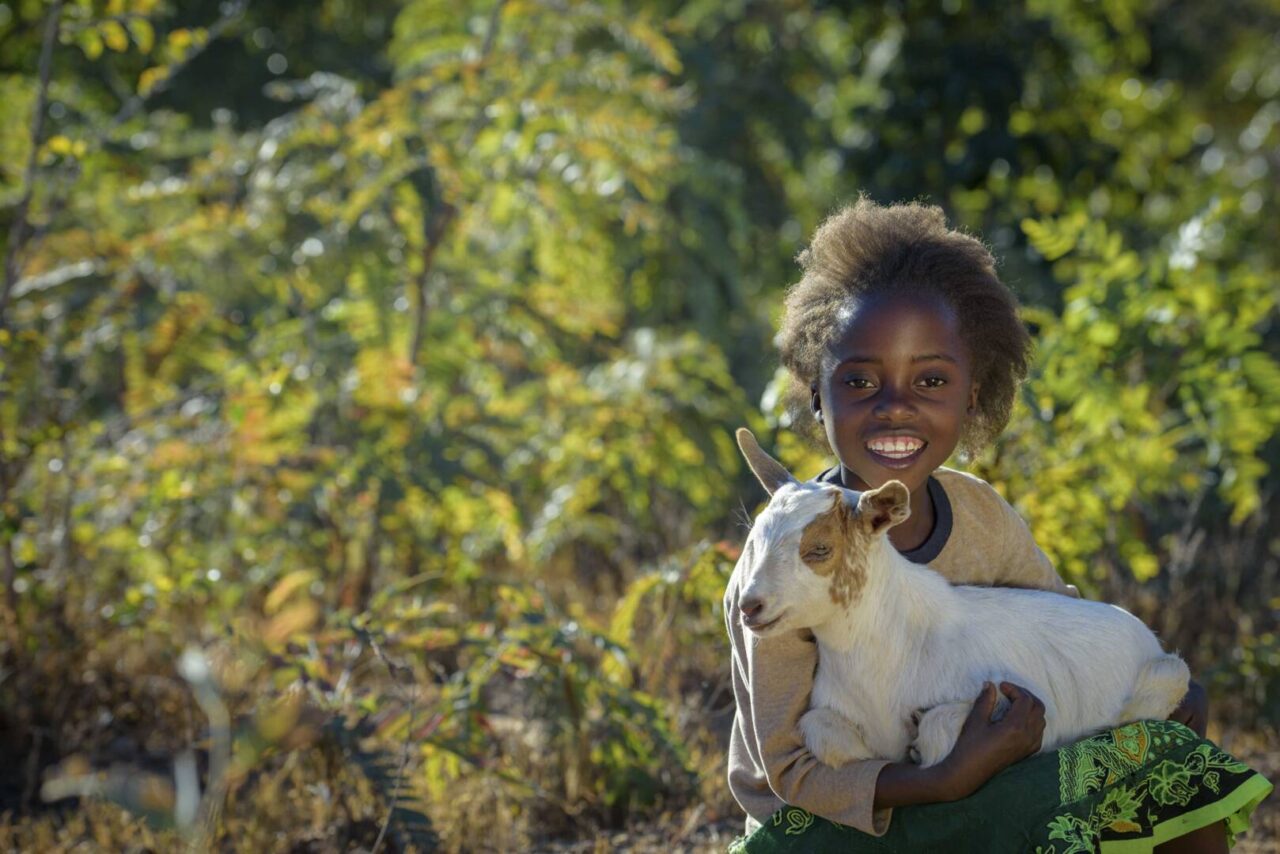
6. Family activity: Gift-giving
This game encourages your family to take time during the giving season to discover the abundance of gifts within your home — and within you.
Behind every item in our homes is the talented work of others — people who use their knowledge and gifts to produce the things we need, as well as all the people in between who get these items to us. How would your life change if everyone stopped using their God-given talents?
What you’ll need:
- A glass of water
- A fruit or vegetable
- A book
- A loaf of bread
- A shoe
- Pen and paper
Do the activity with your family
Place the items on a table and give everyone a pen and paper to write on.
Ask each person to write down how others were involved in the making of each item. What talents, tools, or knowledge were required for them to be able to create each item? In what way do they depend on the talents and knowledge of other people? Where did they learn how to create these things?
Once everyone has finished, ask them to share and discuss their answers.
Next, ask them to go and pick out their favorite possession — a toy, book, instrument, hat, ball, etc. Ask them to answer the same questions for these items. Then ask how they would feel if the makers behind these items didn’t use their God-given talents to create them.
Play it forward: What did you learn?
To survive and thrive, we depend on the outpouring of other people’s gifts. People are making and creating throughout the world, for the world — and it is good! In James 1:17, we learn that “Every good and perfect gift is from above, coming down from the Father of the heavenly lights, who does not change like shifting shadows” (NIV). We need to recognize that there are hands and hearts behind the items we use daily.
Discuss how God, the ultimate gift-giver, created each of us with a unique set of talents, passions, and abilities. Do you love to draw or dance? Are you great at soccer or math? How could you use your strengths to help others? Also, what does it mean when we speak about “gifts” in terms of talents and skills and not presents under a tree?
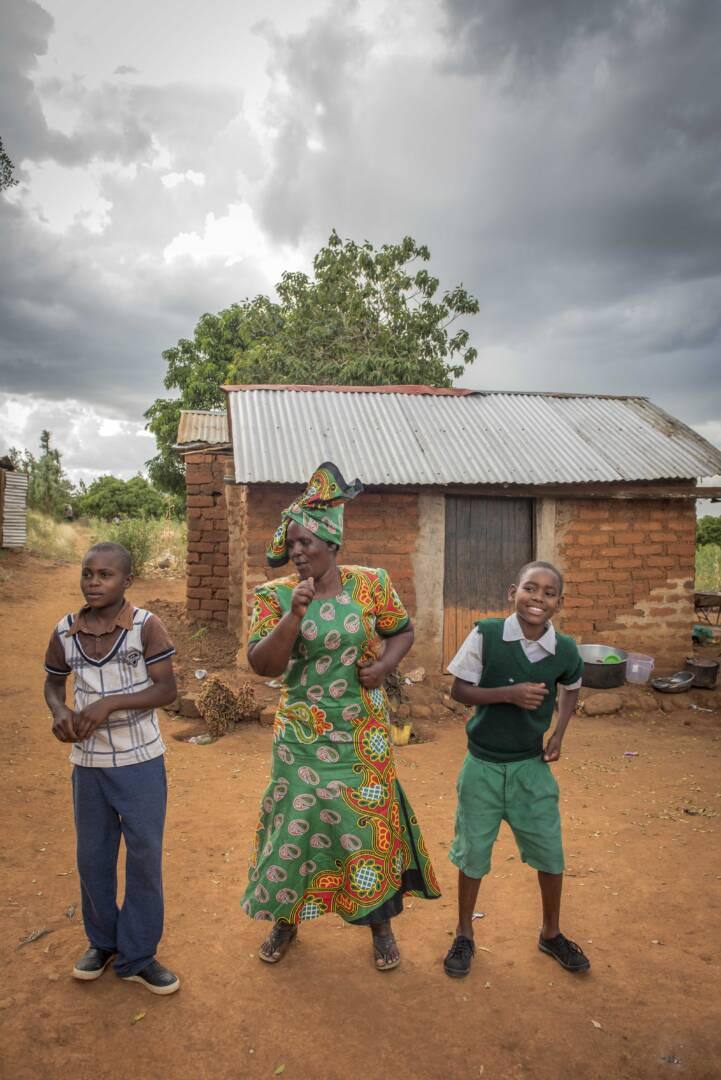
7. Family activity: Christmas ornament
As 2020 comes to a close, a sign of hope is needed more than ever. The star of Bethlehem serves as that sign — on the first Christmas and always — symbolizing the fulfillment of God’s promise to send a Messiah. It also brought joy to the magi who followed the star to the place where Jesus was.
The goal of this activity is to celebrate the hope we have in Jesus, the light that shines in the darkness.
What you’ll need:
- Modeling compound (white works best; be sure it’s the type that air dries)
- Parchment paper or silicone mat
- Roller (a glass bottle works, too)
- Star cookie cutter
- Straw, thin wooden dowel, or chopstick
- Sandpaper
- Mod podge
- Paintbrush
- Gold glitter
- Sharpie (optional)
- String
Do the activity with your family
Gather all your materials for the craft.
- Roll out the modeling compound on the parchment paper or silicone mat to about a centimeter’s thickness.
- Cut stars out with your cookie cutter.
- Punch a hole in the top with your straw.
- Dry ornaments overnight (leave on the parchment paper/silicone mat for easy removal).
- Sand the edges the following day.
- Brush with mod podge.
- Dust with gold glitter.
- Write on the star an encouraging, seasonal word like joy, hope, or love.
- Knot a string through the hole.
Play it forward: What did you learn?
Creating your own ornament is a beautiful reminder of God’s promised Messiah come to life. Can you make an extra ornament or another Christmas craft to pass on to friends, teachers, or neighbors, or to leave as a surprise for someone who could use hope?
After they had heard the king, they went on their way, and the star they had seen when it rose went ahead of them until it stopped over the place where the child was. When they saw the star, they were overjoyed.—Matthew 2:9–10 (NIV)
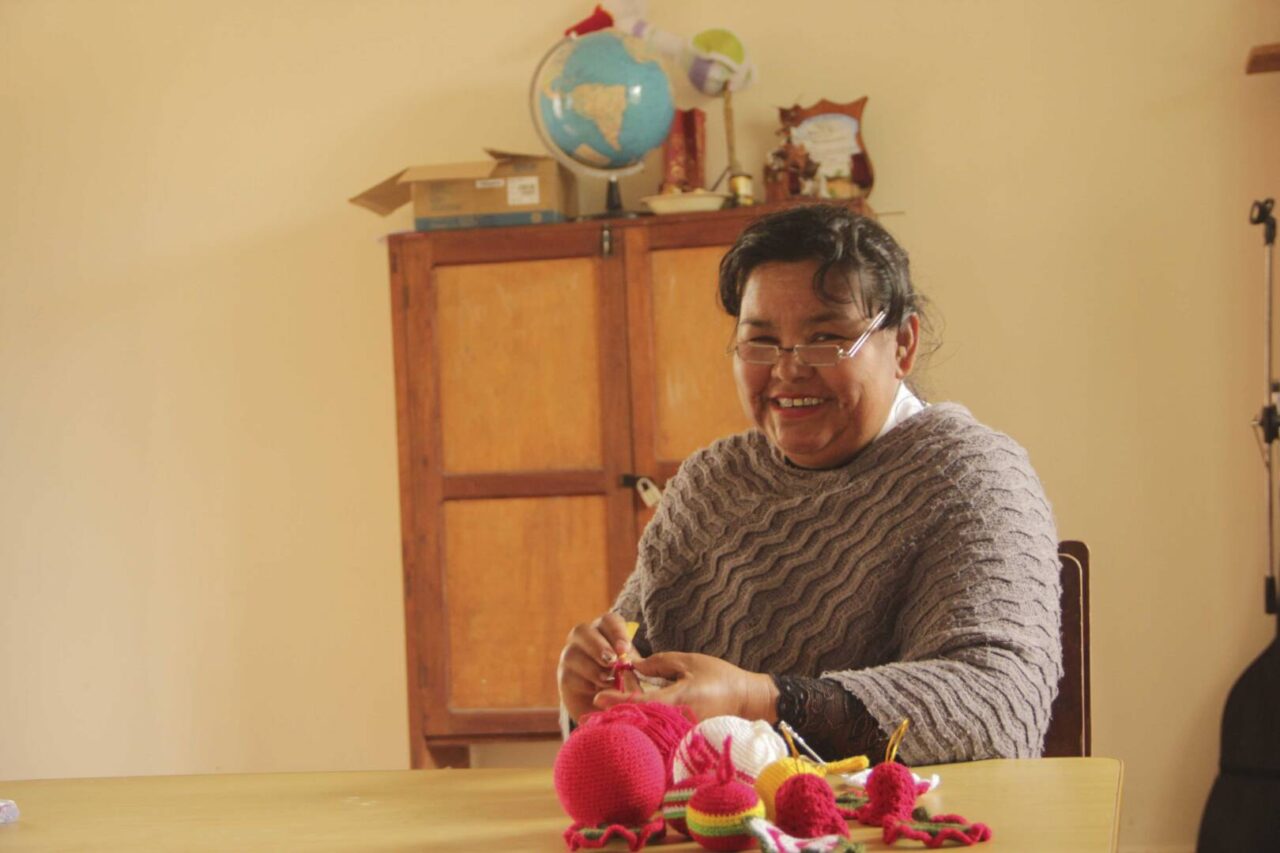
8. Family activity: Three gifts of the magi
Why do we give gifts at Christmas? A major reason is the story of the wise men: They were individuals who, upon hearing about the birth of the Messiah, followed the star of Bethlehem to worship, praise God, and show honor for God’s son, bringing three generous gifts to the Christ child. In fact, we give each other presents at Christmastime to duplicate this same act!
Challenge: Gift others with blessings, acts, and prayers with your own three magi boxes.
What you’ll need:
- 3 shoe boxes (or small shipping boxes) that are easily opened and shut
- Scissors
- Sharpie or marker
- Paper
- Pen or pencil
- Ribbon, glue, crayons, glitter, stickers
Get started
Gather all your materials for the activity.
- Label box #1 “Prayers.”
- Label box #2 “Gifts to Family.”
- Label box #3 “Gifts to Others.”
- Cut a stack of paper and place it next to the boxes, along with a pen or pencil.
Do the activity with your family
Time to start writing! Write prayers for the prayer box: They can be prayers for yourself, your friends, your community, your world. There’s no end to the amount of prayer the world needs, especially now, and no prayer is too big or small.
Then, think of ways your own family can gift acts of kindness to each other. Can you help one another with chores around the house? Home-school a younger sibling or take on extra tasks while a parent is working? If you own animals or run a farm, perhaps you can volunteer to take on and even learn the work of another in your household.
Then, think of how you can gift your help to others: shoveling walkways for neighbors, creating Christmas cards for volunteers in your church, dropping off eggs from your chicken coop to a neighbor in need, and more.
On coming to the house, they saw the child with his mother Mary, and they bowed down and worshiped him. Then they opened their treasures and presented him with gifts of gold, frankincense and myrrh.—Matthew 2:11 (NIV)
9. Family activity: Wear it again
Some of us ask for new clothes for Christmas, but do you need those clothes? Or is it a want? Most of us take our clothes for granted and have more than enough to wear. That’s not the case for many children around the world who might have only one or two outfits total. This challenge takes the conversation even further. Clothes are just an example of all the things we have that are often too expensive or considered “extras” to many people around the world.
Do the activity with your family
Wear the same outfit today that you wore yesterday. (Bonus: Sleep in the same clothes at night, too!) During the day, think about how you look, feel, and even smell. Notice if anyone comments about you wearing the same thing you did yesterday.
Play it forward: What did you learn?
At dinnertime, discuss the following questions together:
- Did anyone notice you wore the same clothes today? What did they say, and how did you feel about it?
- How do we buy clothes? Where does the money come from?
- Having money to buy the things you need is important. What are other things our family needs to buy every week or month?
- What are different ways people can earn money if they live in very poor communities?
- Do you think it’s better to keep giving people money all the time, or help them learn how to earn their own money? Why?
Bonus activity: A giving sacrifice
Have every family member go through their closet and find a few nice things to give away — good toys, clothes, etc. Go together and give these to a local charity. You can also ask your pastor about virtual giving opportunities during Christmas, or give to enable real change that lasts, such as gifting animals whose wool helps pay for clothing (and whose milk helps feed the family!).
… I needed clothes and you clothed me. …—Jesus (Matthew 25:36, NIV)
10. Family activity: Hard times, stolen dreams
Right now, we’re experiencing a global pandemic. Yet the sad truth is that even when not facing the uncertainty of COVID-19, millions of kids around the world get sick from illnesses that we already know how to prevent. Many millions of others have to drop out of school to work very long hours at hard jobs. Often this means they can’t get a good education and reach for their dreams. By stealing their childhood today, and their future tomorrow, sickness and child labor create a kind of prison for kids like these.
Challenge: Pray as a family for global access to healthcare, for medicine that would help stop COVID-19, and that children live out a bright future, free from child labor.
Take the short quiz with your family
First, read this definition of child labor:
Child labor is when kids under 18 are forced to work for a living. Sometimes this work is dangerous, like in mines or fireworks factories or as a trash recycler. Sometimes it is as a housemaid or nanny. Often, kids are promised good pay for their work, and then get little or no money. Child labor can happen when after-effects of disease — such as a global pandemic — causes families to lose income.
Now, listen to the following short stories and decide whether each one describes child labor or a chore.
Rosie, 13
Rosie goes to online school every day. When she is done with school, she must make dinner and watch her 5-year-old sister for two hours until her mom gets home from work. She also has to clean her room once a week. She’s a pretty good student who spends most evenings doing her homework, but sometimes she plays video games with friends.
Mateo, 11
Mateo’s school is overcrowded and poorly run. He wants to be a math teacher, but he knows his parents are having a hard time paying for his school fees, clothes, and school supplies, because sometimes there’s no food to eat and they skip meals. It’s been worse ever since COVID-19 hit and they weren’t allowed to farm, losing much of their crops. Mateo decides to drop out of school and start working on the streets as a trash recycler.
Hope, 14
Hope left school earlier this year; her mom finally got a new job after losing it when the pandemic happened. The hours are long, and her parents need Hope’s help taking care of things. Hope now works from 6 in the morning until 7 at night preparing meals, cleaning, doing laundry, grocery shopping, and taking care of three younger brothers and a sister. She would like time in the evenings to see her friends, but she’s just too tired.
Joseph, 16
Joseph’s family has a small farm. At harvest time (which lasts about three weeks), he is expected to help out after school on weeknights and all day on the weekends. It’s hard work, and he’s tired all day at school.
Radha, 8
Radha’s parents were unable to pay a debt they owed to a moneylender, who arranged for her to work to pay back the money. She now works in a match factory 10 hours a day, sitting on the floor. The boss won’t pay her on the days he thinks she hasn’t done enough work.
Have you decided? If so, here is the answer key:
Rosie and Joseph are doing chores. The work isn’t harmful, and it doesn’t keep them out of school or away from normal childhood activities. These chores are normal responsibilities that come with being in a family.
Mateo, Hope, and Radha are doing child labor. All three of them are unable to go to school, are working unreasonable hours for little or no pay, and have no chance for a normal childhood.
Play it forward: What did you learn?
At dinnertime, discuss the following questions together:
- When was the last time you were sick? Who looked after you? What medicines did you take?
- Many poor communities don’t have enough doctors or medicines for sick kids — and many parents can’t pay for them. How do you think that makes the parents feel? What if we didn’t have money for a doctor or medicine that you needed?
- What chores do you do in our family? Do you get paid? Why or why not?
- If you had to leave school to do something like recycle trash for 12 hours every day, how would it affect your dreams for the future?
Pray together using these prompts:
- Pray for girls and boys who have to work hard instead of going to school.
- Pray that kids who are sick would get the medicine and care they need.
- Pray that parents would earn enough money to pay for medical care if their children need it.
- Pray from your heart for kids who feel like they’re in prison because they’re always sick or have to work long, hard hours.
… I was sick and you looked after me, I was in prison and you came to visit me.—Jesus (Matthew 25:36, NIV)
The greatest gift of all came into our lives the day Jesus was born! Spend time with your family enjoying the blessing of their presence, the joy of the Lord, and the many lessons learned by participating in these activities.
